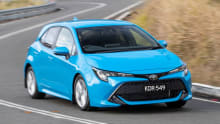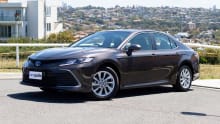
How much does it cost to replace a windscreen?
This used to be a simple question since most car windscreens were made from the...
Browse over 9,000 car reviews
.jpg)
Like any grudge purchase, many of us don’t really pay too much attention to car insurance. You buy it because you need it.
But how much and what type of insurance do you need? And why is there a big debate over comprehensive vs third party insurance?
In fact, what is the actual difference between comprehensive and third party car insurance? What does car insurance cover?
To be honest, the answer is not a simple one, because there is actually more than one type of third party insurance cover.
Similarly, the question of how does car insurance work in Australia, does not end with a one sentence answer.
So, let’s start at the start and look at third party vs comprehensive car insurance. And what is comprehensive car insurance?
Fundamentally, comprehensive insurance covers you against the costs of injuries to anybody caused by your car, damage to others’ property caused by your car and accidental damage to or theft of your own car.
Let’s say you accidentally lose control of your car, crash into a car coming through the other way and then cannon through a fence and into somebody’s house.
If you’re comprehensively covered (and provided you haven’t breached any conditions, which we’ll get to in a minute) your insurance company should pay to sort out the injuries and damage to all parties and property.

Even though the whole episode was caused by your poor driving you should be covered and will need to pay only the excess (an amount that can be hundreds or even thousands of dollars and amounts to the bit that won’t be paid by the insurer).
So, if that’s comprehensive insurance, what is third party car insurance and what does third party car insurance cover? To answer that, you need to be specific about which third party insurance you’re dealing with.
To start with, the most basic form of third party insurance covers other people accidentally injured by your car.
Doesn’t matter whether they’re pedestrians or occupants of other cars, this type of third party cover is designed to pay for their medical costs, mental impact and income losses, but not their property if that is damaged in the same incident.
This is the simplest third party cover and, in Australia, it’s the one you must legally have before you drive on a public road.
That’s why it’s also called Compulsory Third Party (CTP) insurance. In some states and territories, it’s included in your annual registration fee, in others, you have to arrange it yourself through your choice of insurer.

In the case of compulsory third party insurance WA and Victoria (to name just two states) include it in your annual registration fee. But NSW, as an example, insists you buy your CTP separately to your rego fees.
If you don’t want to be liable for the cost of damage to other peoples’ property, then you need comprehensive car insurance meaning you’re covered for property damage as well personal injuries.
But does third party insurance cover damage to my car? No, it doesn’t. Again, you’ll be needing comprehensive insurance for that.
But, of course, third party cover is not that simple. That’s because there’s also a policy type called third party property insurance.
That’s designed to protect you from the cost of repairing other people’s property or cars you damage in your car. Again, though, it doesn’t cover your car, only other peoples’ gear.
This type of policy is often referred to as 'bomb insurance', as in, if your car is an old bomb, it doesn’t matter if it’s damaged or destroyed. But you will generally be covered if you wipe out somebody else’s brand-new Rolls Royce.

Then there’s third party, fire and theft cover. As the name suggests, this covers you against damage to others’ property and cars as well as your car if it’s stolen or damaged by a fire of some sort.
It doesn’t cover your car against normal accident damage, nor does it cover you if the car is damaged by floodwater of hail or if a tree falls on it.
That begs the question: Does comprehensive insurance include third party cover? Yes, it does, so if you purchase comprehensive cover, other people’s health and property are protected as well.
So, having worked out the differences, where do you go next? Is comprehensive insurance worth it? The short answer is yes if you can’t afford to replace your car should it be destroyed or stolen.
The other question is when do I need comprehensive insurance. In many cases, if you’re buying a car on finance, the finance company will insist you have comprehensive cover.
That’s to protect themselves as much as you, but it remains something you need to budget for. Third party insurance coverage won’t cut it in this instance. Only comprehensive coverage will keep most finance companies happy.

So what are the get-out clauses? What does comprehensive car insurance not cover? It varies from insurer to insurer, but generally, you won’t be covered for damage that’s caused by you deliberately (as opposed to deliberate damage by somebody else). You’ll possibly also run into problems if, at the time of the incident you’re claiming for, you were acting illegally, speeding or driving recklessly or under the influence of alcohol or drugs.
And while a comprehensive policy will sometimes include a free windscreen replacement every year, rental cars if yours is out of action, and maybe even roadside assistance, other types of car insurance such as third party property are less likely to include these bonuses.
Some insurers these days don’t offer stand-alone third party insurance meaning you have to buy comprehensive cover from them or shop elsewhere.
The good news is there are plenty of providers of insurance, and shopping around can really save you money.
Motoring clubs are a good place to start, and RACQ, NRMA or RACV comprehensive car insurance can be good value and can also bring bonuses like holiday discounts and cheaper roadside assistance plans.
Other long established products like GIO comprehensive insurance are also trusted brands and have served some Australian families for generations.

It’s also worth tapping into the free online price-comparison sites so you can compare, say Suncorp third party insurance with something like Woolworths third party car insurance.
Just make sure the fine print confirms that the advice is independent and not based on commissions paid to those websites.










Comments